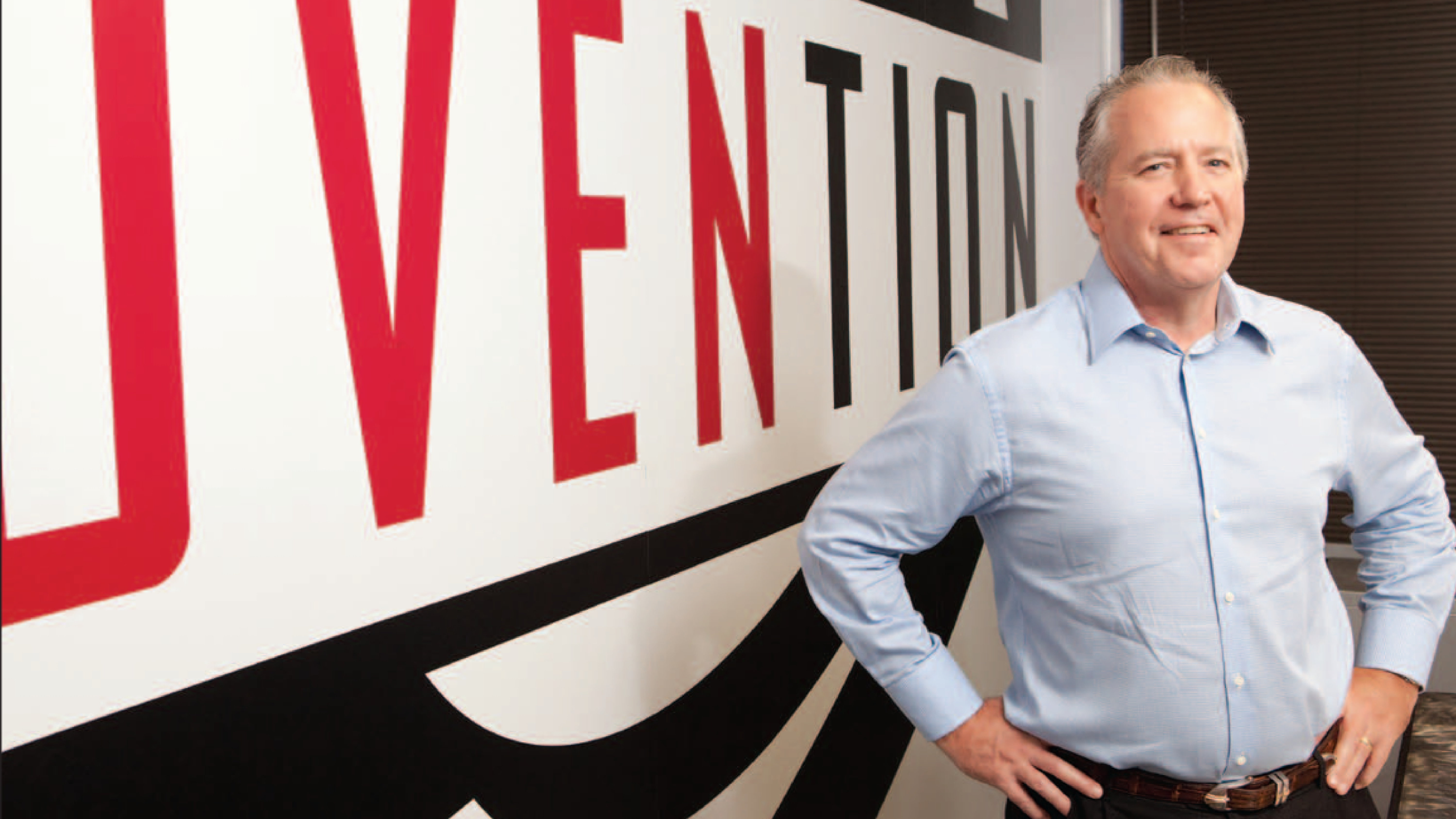
Foodservice equipment pioneer Phil McKee shares his secrets and inventions
By Abbie Westra | awestra@cspnet.com Photos by Mike Gibson
“I wouldn’t be able to execute my foodservice program without the equipment innovations in the industry today.”
Many c-store retailers have uttered various iterations of that phrase over the past few years. Rapid-cook ovens, ventless fryers, impingement heat and other equipment evolutions have helped the industry elevate its foodservice reputation just as much as service, presentation and the food itself have. But maybe it’s time you thank Phil McKee, a man who has made you a lot more prosperous than you probably realize.
With nearly 30 U.S. patents to his name, 56-year-old McKee has played an integral part in many major innovations and inventions in the foodservice industry. When he founded TurboChef in 1991, McKee and his team revolutionized cooking technology—and just what a c-store could offer—with the original accelerated-cooking TurboChef oven. (See sidebar on p. 98 for a cheat sheet on equipment technology terms.)
In 2007, McKee “came out of retirement” with the development of planar plume cooking technology. The innovation creates even impingement sheets of air in rapid-cook ovens for faster cooking, less microwave destruction and increased energy efficiency. McKee worked with Manitowoc on the technology, eventually selling it to the company in 2010 for its Merrychef oven.
About two years ago, he started on a project that would answer this simple question: “What does the operator want?” The answer, according to McKee and his team of 10 full-time engineers, is a single piece of equipment that can cook a wide range of food items with speed, quality and ease of use. The result? Matchbox, manufactured by Dallas-based Ovention, of which McKee is founder and CEO. The Matchbox has two cooking surfaces that take turns in the cooking cavity broiling, baking, grilling or toasting a multitude of foods. The two surfaces allow the preparer to queue up food—hot dogs, for example—at the push of a preset button to specific time and temperature, and prep buns to be toasted automatically after the hot dogs are done. Unlike with conveyor ovens, the enclosed cooking area keeps the temperature high, making for faster cook- ing times and higher yield as less moisture escapes the cooking cavity. The oven is able to quickly increase or decrease to the desired cook temperature between food items, from subs to pizza and cookies.
McKee started a test with West Des Moines, Iowa-based Kum & Go in January 2012. The Matchbox was rolled out at the NACS Show last October, receiving “instant, chin-to-chest reactions,” says Ashley Zickefoose, president of Ovention, who previously served as brand director for menu innovation at Pizza Hut.
CSP talked to McKee about the Matchbox—which he calls a “step-change” cooking technology—and what he sees on the horizon for foodservice equipment innovations.
CSP: If accelerated-cooking ovens were the next generation of the microwave or convection ovens, do you see the Matchbox as the next generation of conveyor ovens? Was that the goal?
McKee: That’s a good, simple summary if someone had to say it in 15 words or less.
… But what we found is that we’re able to replace not just conveyors but in certain applications convection ovens and, in some applications, grills.
If you’re talking to someone building a new concept around our oven—and we have people doing that—it’s a pretty easy deal. But everyone else already has a footprint; they already have X amount of square feet and X pieces of equipment. They may look at our oven and say, “Wow! I really want the benefit that it brings me, but I’ve already got a pretty full kitchen, so what am I going to take out in order to put this new engine in?”
We find ourselves taking things off the grill, out of the convection oven, out of the conveyor oven [and into the Matchbox].And if you look at the utilization of each of those other pieces of equipment in the kitchen. … A fryer? All it does is fry. You can’t grill on a fryer, and you can’t fry on a grill.
So yes, while we started off trying to make a smarter conveyor, where we ended up is really a new engine for the kitchen, particularly where the operator is seeking food quality, a precision cook, easy [operation],without a hood. That’s our sweet spot.
CSP: What, to you, has been the biggest advancements in food- service equipment technology over the past 10 or 20 years?
McKee: Before the conveyor oven, if you were going to cook a pizza, you’d cook it on a deck oven. When the conveyor oven was created, it was a huge, huge step for- ward compared to deck ovens.
When you look at combi-steamers, that was a pretty big step forward. That happened a little bit hand-in-hand with the microprocessor. It made having different cook powers at different times more precise.
So I would say conveyor ovens, which [happened] around the late 1970s, and the combi-steamer, which was about the time of rapid cook (early 1990s), maybe a little before that. Those were big ones.
CSP: What innovations do you see happening next?
McKee: I get intrigued by the increasing number of places where food is served. C-stores were not a big part of foodservice volume 15 years ago. And look at how much there is now and how much there will be 10 years from now. That’s all good and well, but if you look at the structure of the c-store model, you tend to not have the skilled foodservice labor and, in many cases, the space. So I get intrigued when I think of operational things like food inventory and tying food inventory to the POS, making sure you have enough items in the refrigerator. And then you get into automated food handling—taking something out of the freezer and into the refrigerator based on what your POS is saying your velocity has been. All of that might sound a little Rube Goldberg, but the fact of the matter is the consumer is telling the c-store operator, “We want good food at your location,” but the c-store operator has a problem with the execution of it. So once we’re done with every cooking and holding apparatus that we can figure out, I see a fertile field in food logistics in the store and making it easy for the store operator to not lose track, and focus on keeping quality and food safety up. You can’t remove all of the need for human thought from a process like that, but … Walmart restocks their shelves in some cases every day. They’ve figured out how to manage giant, massive systems through some degree of automation even if it’s just information automation. I think there are also opportunities for improved food-holding science. The holding manufacturers are great, but if you look at the change that c-stores are undergoing as more and more of the daily food intake is purchased at c-stores, you’ve got the age-old problem of the quality of the food as it’s held. … So the science underneath the food hold [and] making sure that it keeps its moisture and crispness for a reasonable amount of time—I think that’s fertile ground.
“While we started off trying to make a smarter conveyor, where we ended up is really a new engine for the kitchen.”
CSP: So what’s next for you?
McKee: Beyond the Matchbox, we do have some other cooking platforms in various stages that are pretty well down the road. Ashley expects to have an entire portfolio. We didn’t call the company Matchbox. We called it Ovention because we aspire to change the landscape of cooking, so we will continue to do that.
CSP: What do think the industry is lacking?
McKee: When I talk to the most successful, brightest of operators, be it in c-stores, casual-dining or fi restaurants, they always say the same thing: “People want good food, they want it in a nice environment, in the service time that’s aligned with wherever they are, and they want a good value.” It is no more complicated than that. So equipment that delivers on those things will be successful. Operators who focus on those things will be successful. Food is so personal. It’s so intimate. It’s something that we consume for pleasure. We as operators and equipment manufacturers can lose sight of that. Just deliver good food at reasonable service times and a value, and you will win.
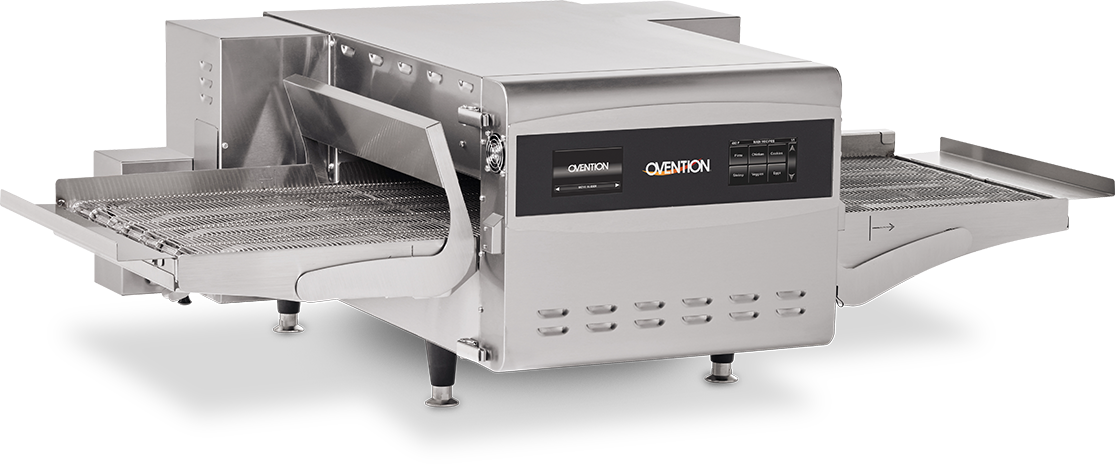
If you value precision and volume, Ovention has the perfect oven to fit your operation. The Shuttle sets the new standard for conveyor ovens everywhere. No other oven can operate as both a conveyor and a closed-cavity oven.
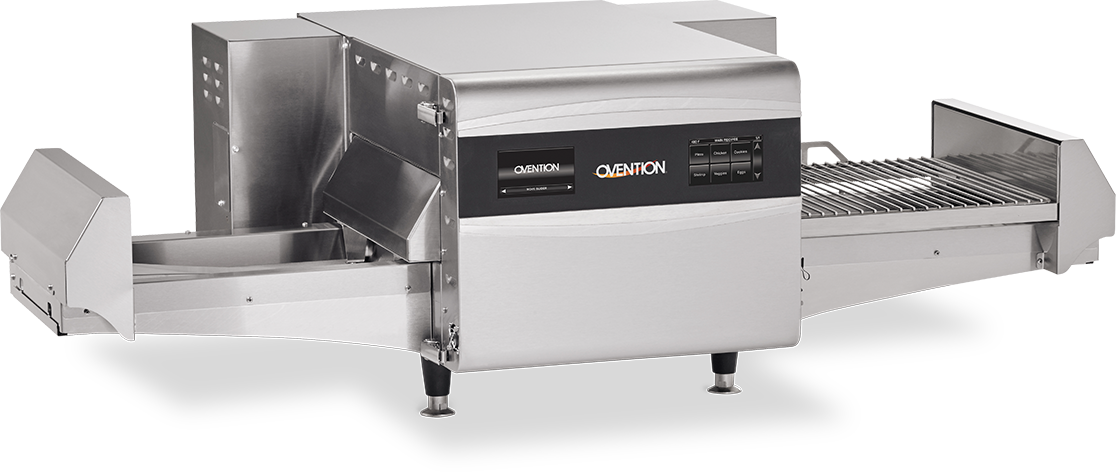
Cook a full menu of delicious offerings without an oven hood. The Ovention Matchbox 1718/1313 takes the traditional conveyor oven to a whole new level.
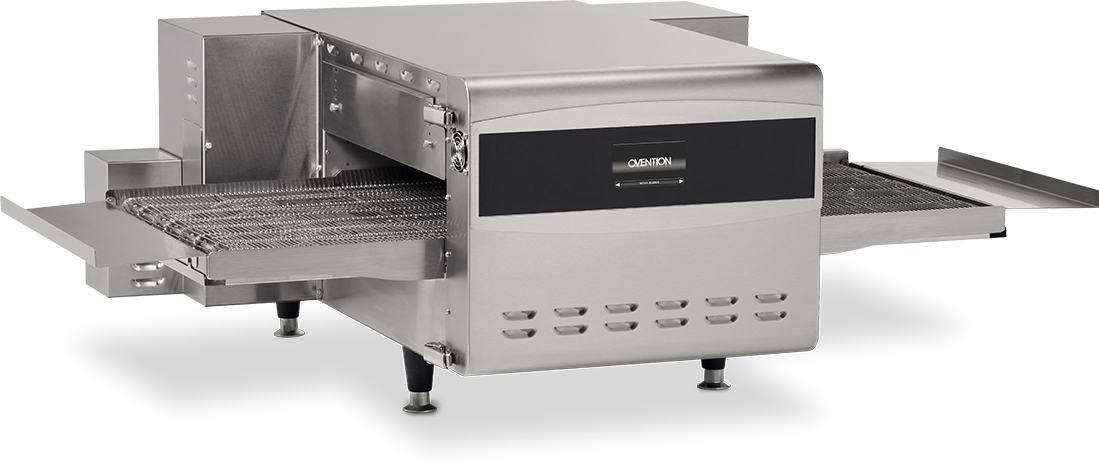
Simple, smart and the right fit for operators looking for a high-throughput conveyor oven. The Ovention Conveyor Oven is the most technologically elegant and operator-friendly conveyor on the market today.
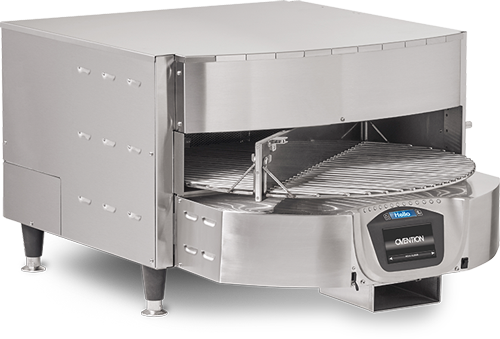
Cook a full menu better, faster, and easier. The Ovention Matchbox M360 has Precision Impingement® technology, a unique cooking carousel, and a small footprint, making it the perfect fit for any operation.
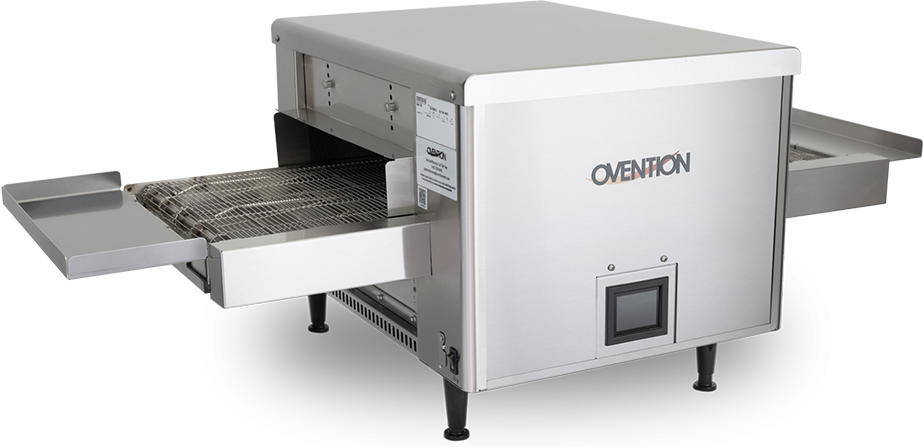
Finish your plates with ease and precision with this robust IR finishing conveyor. Melt, sear, toast, and finish to perfection with this operator-friendly, quiet conveyor.
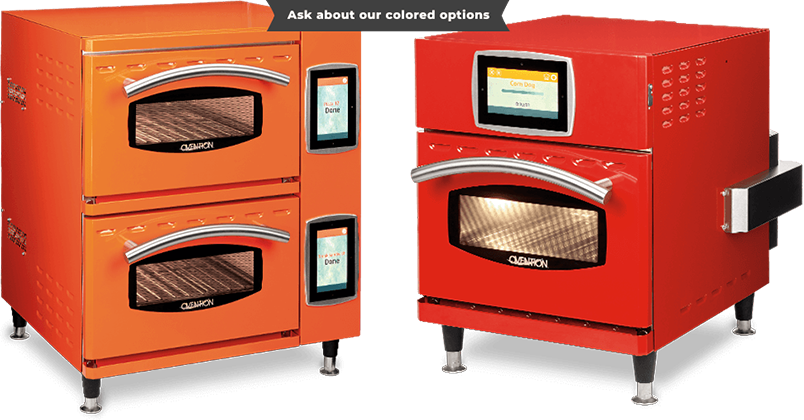
Revolutionary infusion of Linear Impingement and Infrared (IR) technologies. Independently controlled top and bottom cavities, each with its own interior light and control panel.
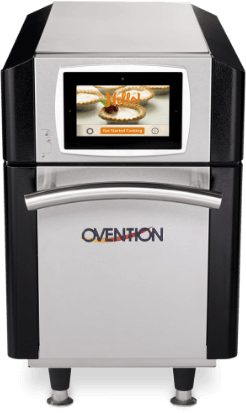
Introducing MiSA; Microwave Speed Assist. Higher quality, higher speed, smaller footprint.
The semester’s underway, lecture halls are filling up, and dining halls are buzzing again. Students want comfort food that feels […]
In foodservice, word of mouth is still king, but today it comes with a star rating. Online reviews shape perceptions, […]
We all know that air can be a tricky cooking partner. Left unchecked, hot air disperses everywhere, resulting in slow, […]
Our goal is to partner with you to help you build your business. We will set up a demonstration that suits your needs, whether you want us to cook your current product, show you a range of new products, or do a side-by-side comparison with another oven we are ready to show you what Ovention can do.
Please complete ALL the fields below to schedule a demo.*
Scroll down to discover more
Experience an Ovention oven in action. We have test kitchens all across the country and representatives waiting to demonstrate our award-winning technology and ease of use. Contact us today to learn how one of our ovens can elevate your culinary versatility and build your business.

Cooked with Conveyor 2600/2000